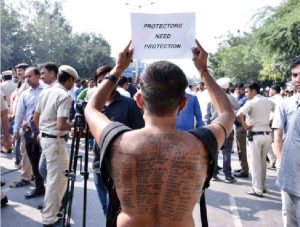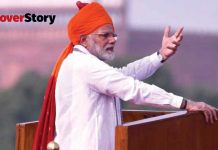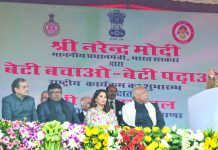 The clashes between law practitioners and law enforcers in New Delhi have prompted the Bar Council of India (BCI) to ask various Bar bodies to identify lawyers who are indulging in hooliganism and bringing the legal institution into disrepute. The trigger in this case has been a video going viral on social media sites showing one policeman on a motorbike allegedly being repeatedly slapped and elbowed by lawyers.
The clashes between law practitioners and law enforcers in New Delhi have prompted the Bar Council of India (BCI) to ask various Bar bodies to identify lawyers who are indulging in hooliganism and bringing the legal institution into disrepute. The trigger in this case has been a video going viral on social media sites showing one policeman on a motorbike allegedly being repeatedly slapped and elbowed by lawyers.
It would be unwise to blame men in black or cops for the clashes because both the police and lawyers consider themselves privileged. Little doubt when lawyers and policemen clash, there are going to be sparks. In this case lawyers allegedly hit policemen and damaged several vehicles and when police force and their families protested, the lawyers struck work. The Delhi High Court asked police to not to take coercive action against lawyers.
Advocates are officers of the court and are bound by a code of conduct and should not have taken the law into their own hands. Action must be taken against offending policemen and lawyers, both. The home ministry and the government have to intervene to work out a mechanism where differences between two pillars of the criminal justice system do not descend into criminality and chaos.
The Bar Council of India has come down hard on the police, saying the protest seemed to be “politically motivated”, termed it the “darkest day in the history of independence”, and demanded the arrest of police officers involved in Tis Hazari clash. The lawyers are so upset that two lawyers in Rohini District Court tried to kill themselves. One lawyer, Ashish Choudhary claiming that reputation of lawyers had been tarnished doused himself with petrol before his colleagues stopped him. Other lawyer, Rohit Pathak threatened to jump off the top of a building in the complex.
Lawyers in Delhi have boycotted work and prevented litigants from entering the premises. Proceedings at Patiala House Court, Tis Hazari District Court, Karkardooma District Court, Saket District Court, Dwarka District Court and Rohini District Court have remained stalled as the lawyers went on strike to protest the police action and alleged use of force on advocates.
In a statement issued in the aftermath of the unfortunate clash, the BCI chairman Manan Kumar Mishra said that the Council had asked the Bar Association of Delhi to call off the strike, but after seeing Delhi Police’s conduct, it cannot “sit tight over the matter”. The council alleged that the policemen remained “absent from duty, shouted slogans, used filthy language” and openly threatened to “smash and kill lawyers”. The BCI, in its letter, also demanded the formation of a high-level committee to find out who were involved in “planning the illegal protest of police yesterday”. “Our demand is to arrest the guilty police officials within a period of one week, failing which we shall resort to peaceful dharna for the arrest of these people and for proper disciplinary action against them. The Bar stands united,” said the BCI statement.
Later hearing a petition filed by the ministry of home affairs on the Tis Hazari clash, the Delhi High Court declined to order a modification of its order. The order had asked Delhi Police to not take any coercive action against lawyers while directing transfer of special commissioner Sanjay Singh and additional deputy police commissioner Harendra Singh. The court also appointed a judicial inquiry panel to probe the clash. Effectively, it restricts the police from taking any coercive action against lawyers over clash. As the lawyer-police-standoff persisted, Delhi’s lieutenant governor Anil Baijal held a meeting with police commissioner Amulya Patnaik and other top officers.
The protesting lawyers do not appear to be in a mood to relent in the confrontation triggered when a dispute over a lawyer parking his car at the Tis Hazari complex flared into violence, including a police baton charge and at least two shots fired. Twenty-one policemen and eight lawyers were injured in the clash, according to the police count.
Around 3,000 policemen and policewomen took part in protest, a demonstration of anger over an assault on members of the force by lawyers at the Saket district court on Monday and an expression of their resentment over senior officers for not rising to their support. One policeman on a motorbike was captured in a video being repeatedly slapped and elbowed by lawyers.
It is worth mentioning that the Law Commission of India had recommended a slew of amendments to the Advocates Act (Regulation of Legal Profession), 1961. The Commission had observed that advocates’ unprofessional conduct, such as going on ‘frequent strikes’ to protest over ‘irrelevant issues’, had reached ‘terrifying proportions’. Though the amendments have not seen the light of day amid stiff resistance from the lawyers, it is beyond doubt that the profession needs a self-regulatory mechanism.
letters@tehelka.com












